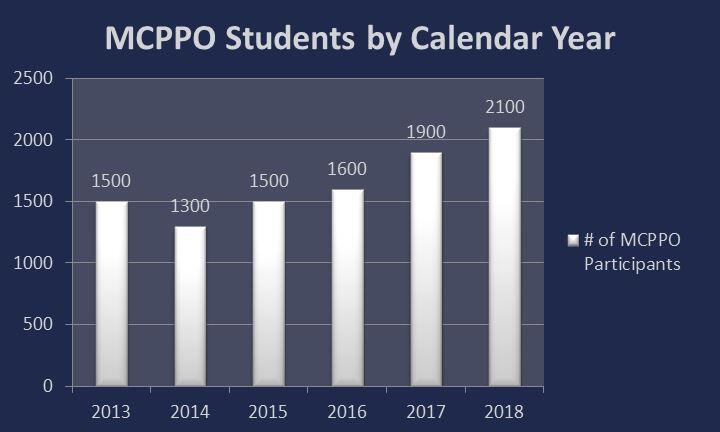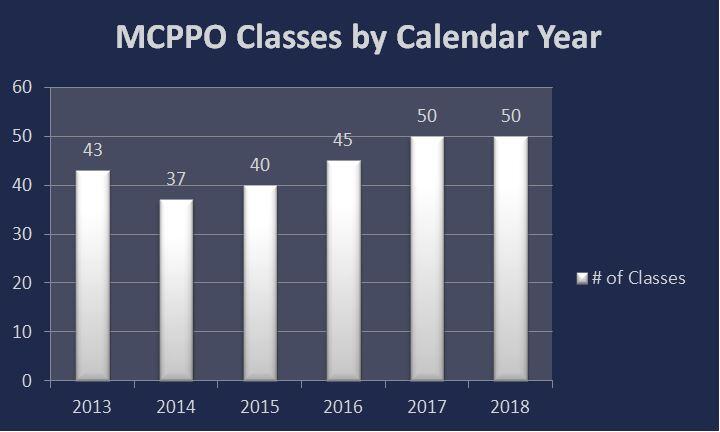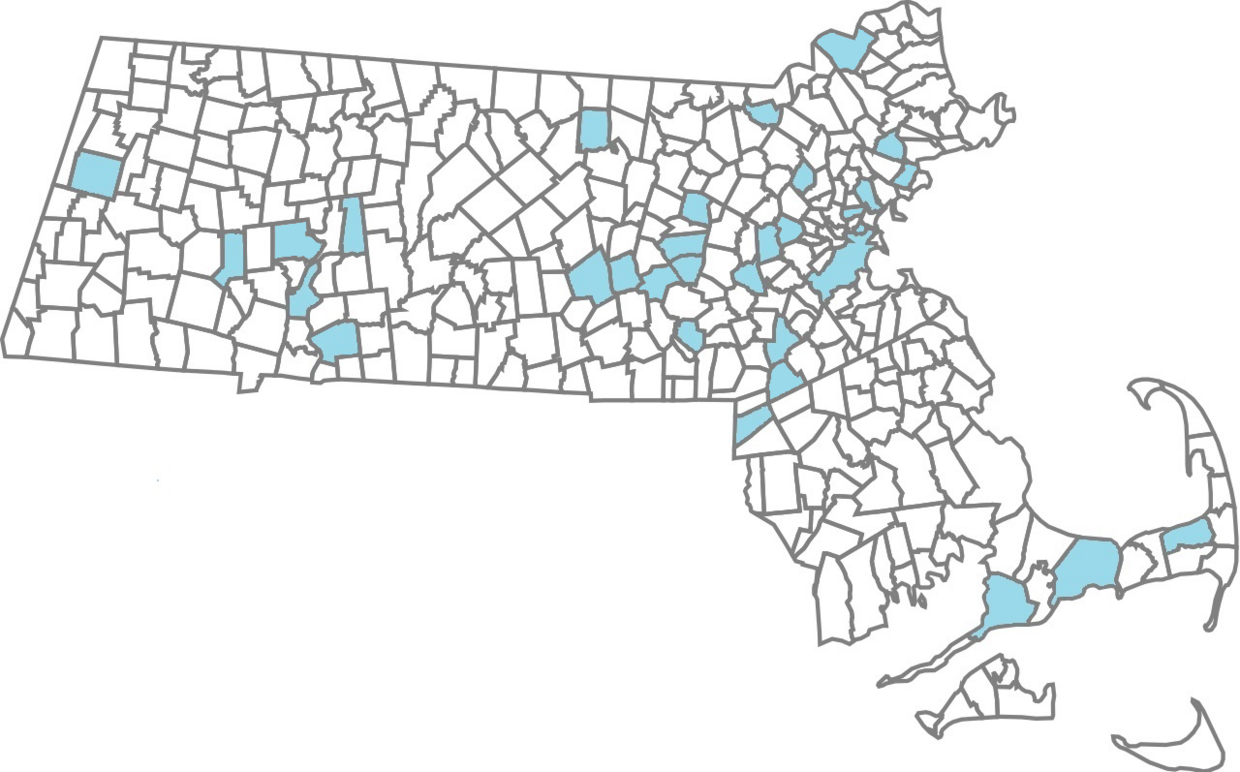Overview
The Office’s Regulatory and Compliance Division (“Division”) provides extensive educational and technical assistance to state and local government officials regarding Massachusetts’ public procurement laws, fraud awareness and public governance. Among other activities, the Division operates the Office’s training programs, publishes educational materials, and offers a hotline to respond to inquiries and complaints concerning public procurement. The Division also interprets and formulates policies for the Uniform Procurement Act, M.G.L. c. 30B (“Chapter 30B”), which governs the purchase and disposal of supplies, services, equipment and real property by local public officials.
I. Training and Professional Development
The Office established the Massachusetts Certified Public Purchasing Official (“MCPPO”) training program 22 years ago. The Office created the training program to promote excellence in public procurement by ensuring that public purchasing officials have the tools necessary to operate effectively and in accordance with procurement laws. Additionally, the program helps private-sector employees understand state and local bidding requirements. Since 1997, more than 24,000 participants have attended MCPPO program classes and presentations.
The Office provides a variety of classes to both public and private employees. These classes can range in time from a few hours to four days. In 2018, the Division held 50 classes, providing training to approximately 2,100 participants across the Commonwealth, including 13 videoconferences. Specifically, the MCPPO program offered three classes required for certification: (1) Public Contracting Overview, an introductory class that provides an overview of Massachusetts’ procurement laws; (2) Supplies and Services Contracting, a more in-depth review of Chapter 30B; and (3) Design and Construction Contracting, providing in-depth instruction on the procurement laws governing public design and construction in Massachusetts.
In addition to the three core classes, the Division also offered classes in several additional topics relevant to public officials, including real property, construction management at-risk under M.G.L. c. 149A, special procurement issues for schools, the fundamentals of running a public procurement office, preventing procurement fraud and effective contract administration. The Division also hosted a hands-on workshop that taught the fundamentals of using invitations for bids and requests for proposals to procure supplies and services.
The Division also offered a four-day class, Certification for School Project Designers and Owner’s Project Managers, in response to the MSBA’s regulations requiring public school designers and owner’s project managers to receive MCPPO certification. The Division taught this class three times in 2018. The Division also offered a one-day class, Recertification for School Project Designers & Owner’s Project Managers, for private sector designers and owner’s project managers who previously received their MCPPO certification.Additionally, the Division offered two Story of a Building classes, in collaboration with the Massachusetts School Building Authority. This one-day class, typically offered at a recently renovated or constructed public school, is essential for all public school officials who are considering undertaking a school building project. In 2018, the Division offered Story of a Building at the Norfolk County Agricultural High School in Walpole and the Woodland Elementary School in Milford.
The Division continued to incorporate additional videoconference classes into the MCPPO program, making it possible for those with travel, budget or personnel constraints to attend MCPPO classes. In 2018, the Division held 13 videoconferences at the following locations: Gateway Regional School District in Huntington; the Centerville-Osterville-Marston Mills Fire District in Centerville; and the University of Massachusetts at Lowell. The Division is always looking for additional locations to host both live classes and videoconferences.
For the first time, the Division held a summer session during July and August. All summer classes were held outside of Boston. Participants appreciated the option of taking classes during the summer.
As part of its effort to reach public officials throughout the Commonwealth, the Division held classes or speaking engagements at the following locations in addition to its primary classroom in Boston:
| Amherst | Brewster | Burlington | Centerville |
| Chelsea | Danvers | Falmouth | Fitchburg |
| Foxborough | Haverhill | Holyoke | Huntington |
| Hyannis | Lowell | Malden | Marlborough |
| Milford | Natick | North Attleborough | Northampton |
| Pittsfield | Salem | Saugus | Shrewsbury |
| Southborough | Springfield | Stow | Walpole |
| Waltham | Westborough | Weston | Worcester |
II. Online Training Videos
In 2018, the Division produced two online training videos, which are available for free on the Office’s website. Contract Administration for Public Employees provides municipalities with the fundamentals of awarding a contract and ensuring that the awarded contract is successfully completed. How to be an Effective Public Board and Commission Member familiarizes viewers with practices that help public board and commission members to effectively perform their roles and to protect their organizations. Providing these videos and other web-based informational materials is part of the Office’s commitment to proactive outreach to public officials and their constituents. The Division is developing additional training videos for the upcoming year.
III. Speaking Engagements
Education is essential to preventing the misuse of public money and property. Throughout 2018, therefore, the Office provided speakers on various topics, including public procurement; fraud prevention; board governance; public administration; and the Office’s mission, accomplishments and investigations. Staff made presentations for numerous organizations, including:
| Assumption College |
Bentley University |
Department of Housing and Community Development |
| Eastern Massachusetts Municipal Auditors and Accountants Association | Eastern Massachusetts Treasurer and Collectors Association |
Group Insurance Commission |
| Massachusetts Association of Public Purchasing Officials | Massachusetts Association of School Business Officials | Massachusetts Continuing Legal Education, Inc. |
| Massachusetts Department of Higher Education | Massachusetts Facilities Administrator Association | Massachusetts Higher Education Consortium |
| Massachusetts Library System | Massachusetts School Building Authority | Merrimack Valley Planning Commission |
| National Association of Educational Procurement New England Chapter | National Association of Housing and Redevelopment Officials Massachusetts Chapter | Operational Services Division MassBuys Conference |
| Salem | Southeast Regional Services Group | University of New Hampshire |
IV. Inquiries and Complaints
The Division regularly advises local purchasing officials on how to comply with the procurement laws, obtain the best value for their jurisdiction and increase competition for public contracts. As discussed earlier (See Hotlines section, above), the Division offers an assistance hotline to respond to questions and complaints concerning public procurements. In 2018, the Office responded to approximately 1,350 inquiries and questions about Chapter 30B and other public procurement laws. The hotline operates every workday and officials can leave voice messages or email the hotline 24 hours a day.
V. Technical Assistance
In 2018, the Division continued its compliance review program, which is designed to help cities and towns improve their procurement practices. As part of the program, the Division evaluates a jurisdiction’s procedures for complying with Chapter 30B, identifies internal control weaknesses, assesses vulnerabilities to fraud, and identifies best practices for conducting procurements.
VI. Publications
The Division publishes a wide range of materials to educate and inform public procurement officials, private vendors and the public. Since 1994, the Office has published the Procurement Bulletin, a quarterly newsletter containing information about public procurement, contract administration, fraud prevention, the Office’s investigations and other topics of importance to helping government operate effectively, transparently and with accountability. During 2018, nearly 5,200 individuals subscribed to the Procurement Bulletin. The Division published the following documents, available below, in 2018:
- Procurement Bulletin, Vol. 24, Issue #1
- Procurement Bulletin, Vol. 24, Issue #2
- Procurement Bulletin, Vol. 24, Issue #3
- Procurement Bulletin, Vol. 24, Issue #4
- Advisory: Conducting Snow-Related Procurements
- Code of Conduct for Consultants on Public Building Projects
- Charts on Procurement Procedures - Revised
Additional Resources
VII. Owner's Project Manager Review Panel
Each month, a staff member from the Division represents the Office at the Massachusetts School Building Authority’s (“MSBA”) Owner’s Project Manager Review Panel (“Review Panel”). When a school district receives state funding to build a new school, it must use an owner’s project manager (“OPM”) to oversee the building project. The Review Panel, led by the MSBA, reviews each school district’s selection of an OPM, including the evaluation process the school district used.
As a member of the Review Panel, Division staff reviews each district’s process and evaluation of its OPM-applicants. This review entails examining both the school district’s needs and the OPM’s qualifications, including the OPM’s project experience, managerial experience, backlog of other ongoing work and financial viability. Staff then participates in the Review Panel’s meeting, listening to school district presentations. After considering the presentations and reviewing the materials, the Review Panel may either agree with the school district’s selection of an OPM or recommend further review and consideration.
| Date published: | April 30, 2019 |
|---|


